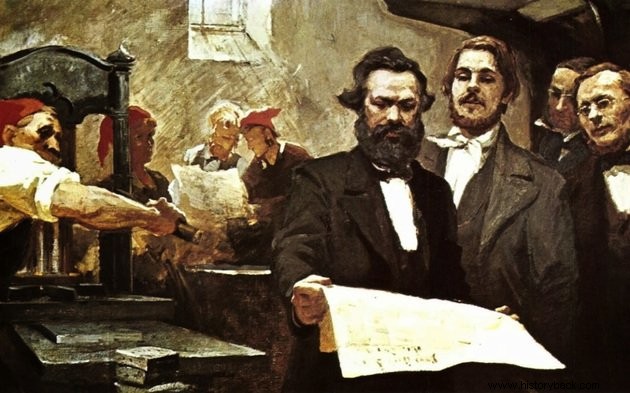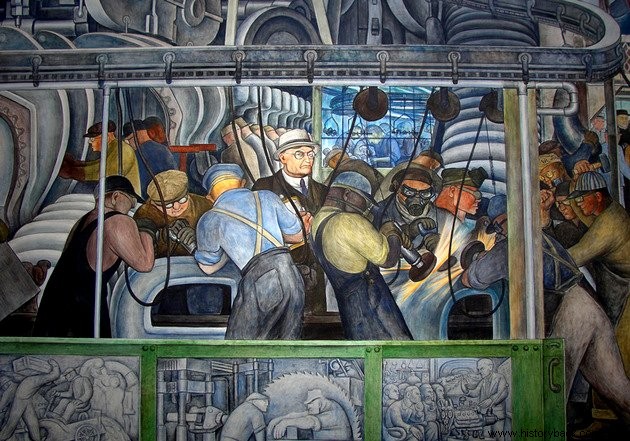Marxism is the set of philosophical, economic, political and social ideas drawn from the writings of the Germans Karl Marx (1818-1883) and Friedrich Engels (1820-1895).
This current of thought influenced intellectuals from all areas of knowledge throughout the 19th and 20th centuries.
Origin of Marxism
Marx and Engels realized that work is the key concept of society. In this way, the entire history of humanity would go through the tension between the owners of the means of production and those who could only carry out the task.
Thus, for Marxist theory, the class struggle would be “the engine of history”. The production of material goods would be the conditioning factor of social, intellectual and political life.

Marx and Engels reflected on human relationships and the institutions that regulated societies, such as private property, the family, government, the church, etc. Hence arise the principles that founded Marxism, also known as “scientific socialism”.
On the other hand, “utopian socialism” already theorized about the means capable of resolving the difference between the members of the proletariat and the ruling bourgeois class.
His ideals inspired various currents of thought that wanted to change capitalist structures such as anarchism, socialism and communism, among others.
Therefore, for Marxists, it is necessary to link thought to revolutionary practice, uniting the concept with praxis to transform the world.
However, those thinkers overestimated the predictability of human societies. After all, many of the countries that claimed to be followers of Marxist ideas did not strictly follow its precepts.
See also:Social Division of LaborMain Marxist Currents
The main currents of Marxism were social democracy, present in Western countries until the present day, and Bolshevism, extinct with the fall of the USSR.
Furthermore, the foundational work of Marxism is “Capital ”, published in 1867. As Marx died in 1883, the 1885 and 1894 volumes were edited by Engels from Marx's manuscripts.
This work remains basic reading and is still influential in the fields of philosophy as well as other areas of the humanities and economics.
See also:End of the USSRInfluence of Marxism
Marxism inspired several revolutions such as the Bolshevik revolutions of Vladimir Lenin and Leon Trotsky, in Russia in 1917.
After World War II, some of these ideas were adopted in the formation of the People's Republic of China, Vietnam, East Germany, Poland, Hungary, Bulgaria, Yugoslavia, Czechoslovakia, North Korea, and Cuba.
See also:Bolsheviks and MensheviksMarxist Theory

Developed at four fundamental levels, Marxist theory is grouped at the philosophical, economic, political and sociological levels, according to the idea of “permanent transformation”.
It is clear, in this approach, that the human being and society can only be understood through the forces that produce and reproduce the basic material conditions for survival.
From this perspective, the analysis of the material conditions of human existence in society becomes fundamental.
On the other hand, Marxism was generated from three intellectual traditions developed in 19th century Europe, namely:
- the German idealism of Hegel;
- the economics-politics by Adam Smith;
- the political theory of utopian socialism, by French authors.
From these conceptions it was possible to elaborate a study of humanity through historical materialism.
See also:What is Ideology?History Concept
For Marx, history would be a process of continuous creation, satisfaction and recreation of human needs. These cannot be understood outside of the historical context and its historically located material determinism.
Knowledge frees man through his action on the world, even enabling revolutionary action against the dominant ideology. This always seeks to camouflage the contradictions of the capitalist system.
Therefore, Marxism perceives the class struggle as a means to the end of this exploitation, as well as for the institution of a society where the producers would be the holders of their production.
Concept of State
About the “State”, Marx realized that it would not be an ideal of morality or reason, but an external force of society that would place itself above it.
However, this would, in reality, be a way of guaranteeing the domination of the ruling class, through the maintenance of property.
Thus, the State would have emerged at the same time as private property and as a way of protecting it, which makes any State, no matter how democratic, a dictatorship.
Karl Marx and Friedrich Engels believe that the State uses various tools to effect its domination. Some examples would be bureaucracy, the territorial division of citizens and the monopoly of violence, guaranteed by a standing army.
Communist Society
Thus, it is implied that the armed revolution would be a way to destroy capitalist society.
Likewise, socialism would be the intermediate stage between the bourgeois state and Communism. In a communist society there would no longer be the division of society into classes, and it would be the end of the capitalist mode of production.
This would be the “Dictatorship of the Proletariat”, characterized by the absorption of social functions destined to the State. Note that state characteristics such as bureaucracy and the standing army also disappeared.
Finally, the proletarian government would give way to a communist society, in which the state and property would be permanently extinct.
See also:Karl MarxAdditional Value and Alienation
Among the various Marxist concepts, the ones of “added value” stand out. and “alienation”.
See also:What is the Alienation of Labor for Marx?Additional Value
It refers to the worker, who produces more than was calculated, creating a value much higher than what is returned to him in the form of salary.
Thus, this surplus labor is not paid to the worker. This value, according to the Marxist view, will be used by the capitalist to further increase his capital, as well as the state of domination over the worker.
Finally, “added value” is the difference between what the worker receives (salary) and what he actually produced.
See also:The Surplus Value of Karl MarxAlienation
On the other hand, “alienation” occurs when the producer does not recognize himself in what he produces, making the product appear as something separate from the producer.
See also:Alienation in Sociology and PhilosophyHistorical and Dialectical Materialism
Historical materialism is a way to understand human societies from the way in which material goods are produced and distributed among its members. This concept gave rise to the theory of “Modes of Production ”:Primitive, Asian, Slave, Feudal, Capitalist and Communist.
On the other hand, dialectical materialism would basically be the class struggle, the contradiction between the interests of the dominant and the dominated which generates historical transformations.
The definitive overcoming of one system by another would be the result of the struggles of a society divided into classes. In it, workers lead the revolutionary process in which they take control of the State, as in the case of the French Revolution, when the bourgeoisie defeats the nobility and takes their place.
Therefore, historical materialism and dialectical materialism are indeed interrelated concepts. The first would give a panoramic view and the second portrays the processes of social change.
Read:
- Materialism
- Dialectics:the art of dialogue and complexity
Personalities influenced by Marxism
- Walter Benjamin
- Max Horkheimer
- Che Guevara
- Stalin
- Zygmunt Bauman
- Florestan Fernandes
Fun facts about Marxism
- Marxist theory became an ideology that spread to regions around the world and underpins governments to this day.
- Marx called himself a materialist and claimed he was not a Marxist.
- Socialist economic reforms, based on Marxist concepts, were also responsible for millions of deaths in the last century, caused by wars and widespread famine.
- The Russian Revolution was the greatest experiment in social engineering in human history.
Read more on this subject:
- Economic Liberalism
- Contemporary Philosophy
- Questions about Karl Marx
- Questions about the Industrial Revolution
- Sociology at Enem:what to study
- Anarchism
